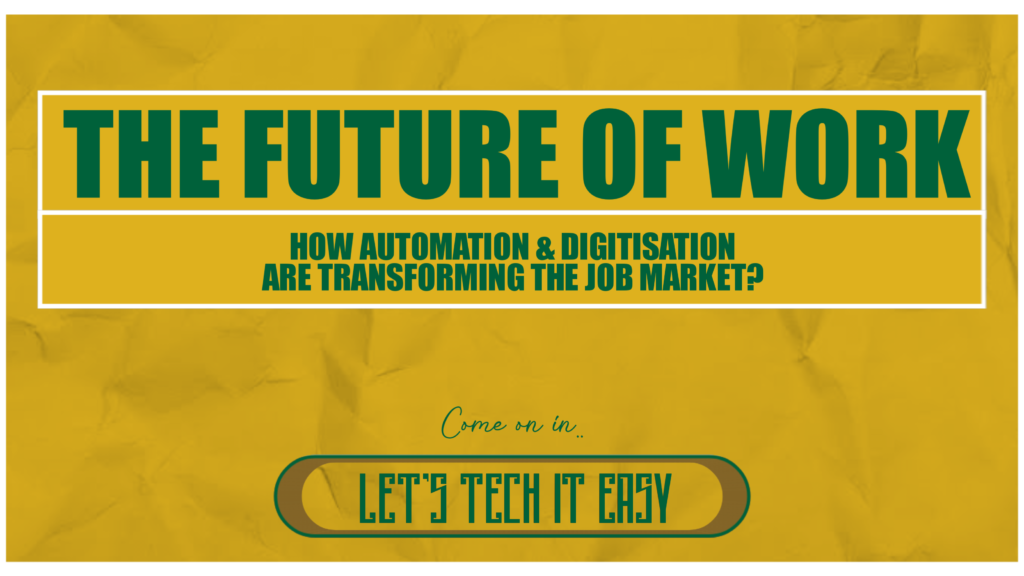The world of work is undergoing a profound transformation driven by rapid advancements in automation and digitisation technologies. From artificial intelligence and robotics to machine learning and the internet of things, these innovations are reshaping industries and redefining the nature of jobs. In this blog, we will explore the future of work, examining the impact of automation and digitisation on the job market, the benefits and challenges they present, and how individuals and organisations can navigate this evolving landscape.
The Rise of Automation:
Automation, powered by technologies such as robotics and artificial intelligence, is changing the way tasks and processes are performed across various sectors. With increasing efficiency and precision, automated systems are revolutionizing industries from manufacturing and transportation to healthcare and finance. The potential benefits of automation are vast, including increased productivity, improved quality, enhanced safety, and reduced costs. By taking over repetitive and mundane tasks, automation allows human workers to focus on more complex and creative endeavors. This shift has the potential to elevate job satisfaction and enable individuals to make a greater impact in their roles.
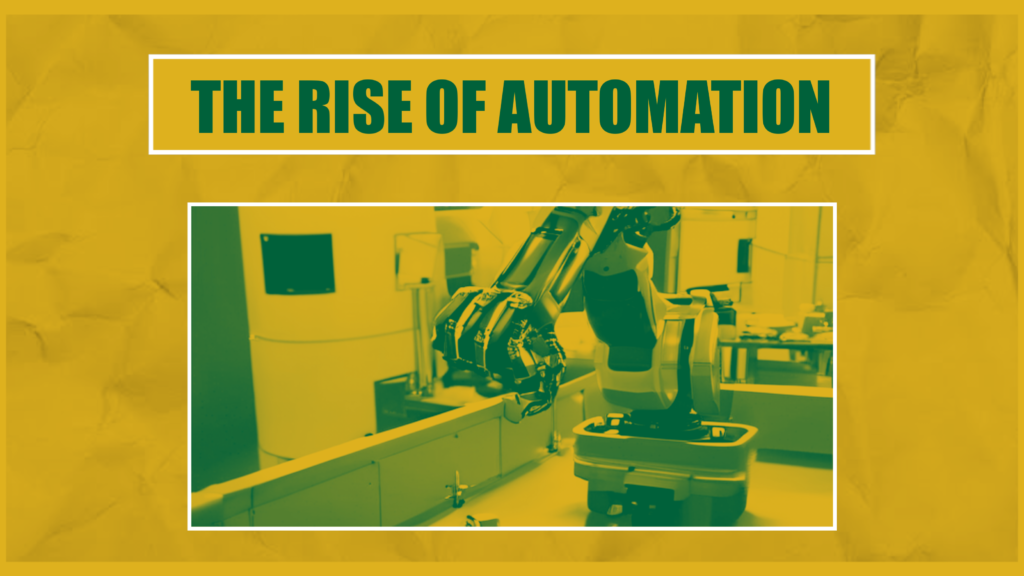
However, the rise of automation also raises concerns about job displacement. Many fear that machines will replace human workers, leading to widespread unemployment. While it is true that some jobs will be automated, history has shown that automation tends to augment human labor rather than completely replace it. As certain tasks become automated, new job roles and opportunities emerge. By embracing automation and focusing on developing skills that complement it, individuals can position themselves for success in the changing job market. Skills such as critical thinking, problem-solving, creativity, emotional intelligence, and complex decision-making are highly valued and difficult to automate. Therefore, individuals should strive to acquire and enhance these skills to remain competitive in the future workforce.
Digitisation and the Digital Workforce:
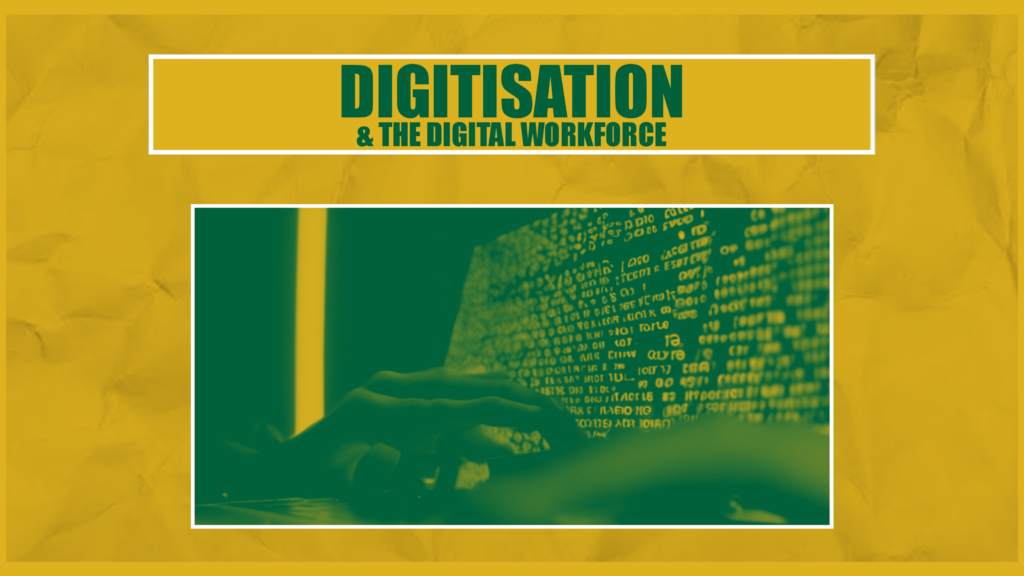
Digitization, the conversion of analog information into digital formats, has paved the way for the emergence of the digital workforce. This transformation has accelerated the adoption of remote work and virtual collaboration tools, enabling geographically distributed teams to work seamlessly. The digital workforce offers numerous advantages, including increased flexibility, access to global talent pools, and improved work-life balance. With the right tools and technologies, individuals can now work from anywhere, collaborating with colleagues and clients across the globe.
However, the digital workforce also presents challenges that need to be addressed. Effective communication becomes paramount when teams are geographically dispersed, relying heavily on digital platforms and tools. Organizations must invest in robust communication channels and protocols to ensure seamless collaboration and information exchange. Moreover, cybersecurity becomes a critical concern as more data and operations move online. Organizations need to implement stringent security measures to protect sensitive information and ensure the integrity of digital systems.
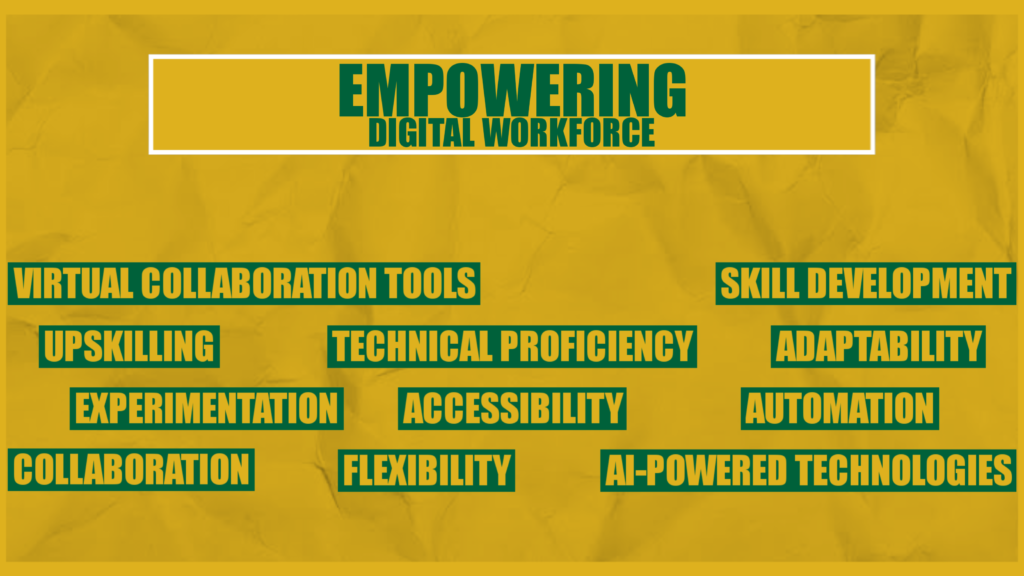
Another challenge posed by the digital workforce is the blurring boundaries between work and personal life. With the ability to work remotely, individuals may find it difficult to disconnect from work, leading to burnout and decreased well-being. Organizations and individuals need to establish clear boundaries and prioritize work-life balance to maintain productivity and overall satisfaction.
The Evolving Skill Set:
As automation and digitization reshape the job market, certain skills become increasingly valuable. While technical skills and digital literacy are essential, the demand for soft skills such as critical thinking, creativity, adaptability, and emotional intelligence is also on the rise. These skills are less susceptible to automation and are crucial for problem-solving, innovation, and effective collaboration.
Continuous learning and upskilling are vital for individuals to remain relevant in a rapidly changing job market. Educational institutions, employers, and individuals themselves must foster a culture of lifelong learning and skill development. By embracing a growth mindset and investing in reskilling programs, individuals can future-proof their careers and adapt to the evolving demands of the digital age.

In addition to soft skills, individuals should also focus on developing a strong digital skill set. This includes proficiency in digital tools and platforms, data analysis, cybersecurity awareness, and remote collaboration. As more organisations rely on digital technologies, individuals with a solid digital skill set will have a competitive edge in the job market.
Embracing the Future:
To thrive in the future of work, individuals and organizations must embrace the opportunities and challenges presented by automation and digitization. A proactive mindset that embraces change and fosters a culture of innovation and lifelong learning is crucial. Organizations should invest in reskilling and upskilling programs to equip employees with the necessary digital skills and empower them to adapt to evolving job roles. At the same time, they must recognize and nurture human-centric skills that complement technological advancements. Creativity, critical thinking, and problem-solving abilities will be highly valued as machines take over routine tasks.
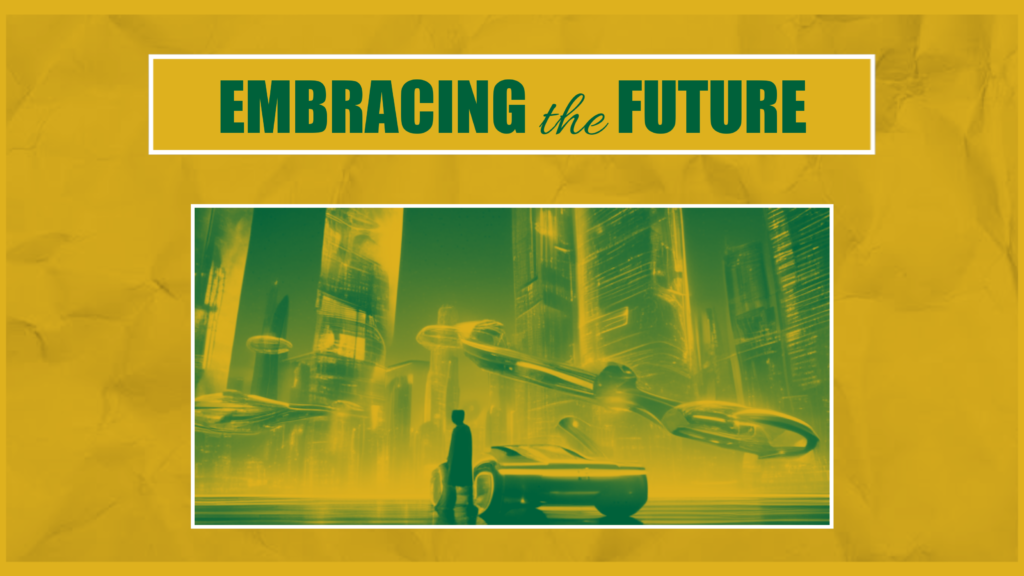
Additionally, fostering a supportive workplace culture that values diversity, inclusivity, and collaboration is essential for employees to thrive in a digital and automated environment. Organizations should encourage autonomy, provide opportunities for growth and development, and create a healthy work-life balance for their employees. By promoting well-being and prioritizing employee engagement, organizations can foster an environment where individuals can thrive and contribute their best work.
Final Thoughts:
The future of work is being shaped by automation and digitization, bringing both opportunities and challenges. While these technologies have the potential to enhance productivity and drive economic growth, they also raise concerns about job displacement and the need for reskilling. By embracing a proactive mindset, fostering a culture of continuous learning, and recognizing the value of human-centric skills, individuals and organizations can navigate this transformative period successfully.
Automation and digitization are not meant to replace human workers but to augment their abilities and create new opportunities. By adapting to the changing landscape and focusing on developing skills that complement automation, individuals can position themselves for success in the future job market. Continuous learning, upskilling, and embracing a growth mindset are key to remaining relevant and competitive.

Organizations must invest in reskilling and upskilling programs to equip their employees with the necessary digital skills and foster a supportive workplace culture. By recognizing the value of human-centric skills and promoting a healthy work-life balance, organizations can create an environment where employees can thrive in the digital and automated era.
The future of work is not about humans versus machines but rather humans working alongside machines to unlock new levels of productivity, creativity, and innovation. By embracing the opportunities presented by automation and digitization while addressing the challenges, individuals and organizations can shape a future where work is more fulfilling, impactful, and inclusive.

